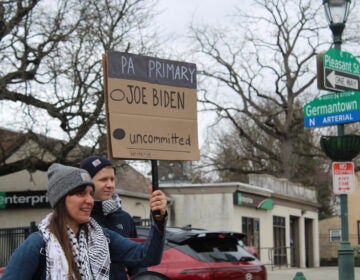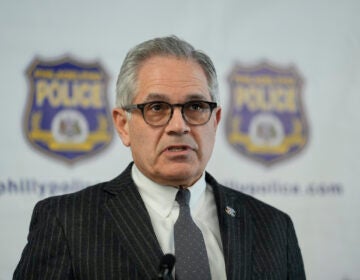Money and the Philly mayor’s race — it’s a new day
Listen Photo via ShutterStock) " title="ssmoneypoliticsx1200" width="1" height="1"/>
Photo via ShutterStock) " title="ssmoneypoliticsx1200" width="1" height="1"/>
(Photo via ShutterStock)
A veteran political hand once told me, “Remember, most important decisions in any campaign are budget-driven. You do what you can afford.”
Money is huge in politics. It typically takes a few million dollars to mount a credible run for Philadelphia mayor, and for a few different reasons, this mayor’s race will be different from any ever conducted in this city.
If you follow this stuff at all, you know that city law now places limits on the size of contributions to mayoral candidates. But unless you’ve got a few years on you, you may not remember how mayoral campaigns used to be financed a few years ago.
Big numbers
I recently pulled out a list of contributions to mayoral candidates in 2003, the last race before limits were imposed. Among them: Dennis Alter of Advanta Corporation, $100,000; Ballard Spahr, big law firm, $100,000; developer Ken Goldenberg, $165,000; Electricians Union Local 98, $100,000.That’s just a sampling.
Things changed after pay-to-play scandals in the early 2000’s. (If you’re new to this, the name pay-to-play derrives from the idea that you have to pay — give campaign contributions — if you want to play, that is win government contracts.)
City Council imposed dollar limits on contributions, but the possibility remained that law firms or developers could get around the limits by having a few dozen partners or friends write individual checks. The candidate would understand all that dough came from a single special interest. It’s a process called bundling.
So Council also passed a pay-to-play law with special rules for anybody connected to a firm that might want city business.
It changed things for some heavy-hitting fundraisers, like attorney Alan Kessler, a partner in the Duane Morris firm. We talked recently about what the rules in the pay-to-play law mean for someone like him.
“If we have 30 people here at a fundraiser, the total of all those people’s contributions get attributed to me, or to the firm,”Kessler said, “even though they’re given independently by people who don’t have a gun to their head. They write their own checks out of their own checkbooks.”
Under the attribution rules of the pay-to-play law, those checks collected by Kessler would quickly exceed the contribution limit and potentially eliminate his firm from any city business for years to come.
The result? He’s pretty much out of the fundraising business, at least in a mayor’s race.
And, Kessler says, “It significantly restricts the ability to raise the kind of money that’s been raised for mayoral races in the past.”
Crying poor
Indeed, several candidates complain that you just can’t fund a modern campaign under these rules.One who begs to differ is the man who sponsored the pay to play bill in City Council 10 years ago, current Mayor Michael Nutter. He ran in a five-way mayoral primary in 2007 under the same rules candidates face today.
“I raised $4.6 million, following the rules, each and every step along the way,” Nutter told me, “and numerous other candidates raised in the millions of dollars under these rules in the 2007 election. Everybody was on TV.”
There’s a caveat here: Tom Knox, a self-funding millionaire in that race triggered a doubling of the contribution limits in December 2006, but the anti-bundling rules were in effect. Nutter raised money mostly because he started early and worked hard at it.
Candidates in the current race so far aren’t raising enough to wage media campaigns — and this makes this mayor’s race unusual.
That doesn’t mean you won’t see TV ads in this race. Groups other than the candidates themselves may be spending huge sums to support their chosen candidates.
It’s legal due to Pennsylvania’s election laws, which are more lax than the city’s, and U.S. Supreme Court rulings such as Citizens United.
A federally-registered Super PAC called Build a Better Pa., funded by local labor unions, is already running a TV had pushing former Councilman Jim Kenney.
Some wealthy pro-school choice backers are doing the same for state Sen. Anthony Williams. They’re already in for a quarter million bucks and are promising to spend more.
Who cares?
Is anybody mad about this? Well, yeah — the candidates who aren’t getting help from outside groups, such as former District Attorney Lynne Abraham.
“What it means is that big money is putting candidates in their hip pockets and corrupting the process,” Abraham said in a recent interview. “This is not only unfair to the public. It’s unfair to every candidate who is playing by the rules, abiding by the campaign finance laws and raising money one phone call at a time.”
Abraham challenged all candidates to sign a pledge rejecting the help of independent expenditure groups. None signed, and it’s clear outside groups will play a big role in the race.
But while the laws permit the groups to raise money and spend what they want, they’re barred from coordinating with candidates they support.
And that brings us to another defining characteristic of this race. The city Ethics Board knows what’s going on and has enacted rules to police coordination between outside groups and candidates. Paul Ryan, director of the Campaign Legal Center, says that based on its recent performance, Philadelphia’s Ethics Board deserves to be taken seriously.
“The Federal Election Commission has had those types of regulations on the books for many years,” Ryan said. “I have more faith that the Philadelphia Ethics Board will enforce it. They’ve got a great reputation nationally.”
So this is what we’re in for: a race where TV ads come not from candidates, but their well-heeled friends, whose messages candidates supposedly have no say in, as regulators try to stay on top of it all.
We’ll stay on top of it too, as we continue our coverage.
WHYY is your source for fact-based, in-depth journalism and information. As a nonprofit organization, we rely on financial support from readers like you. Please give today.





